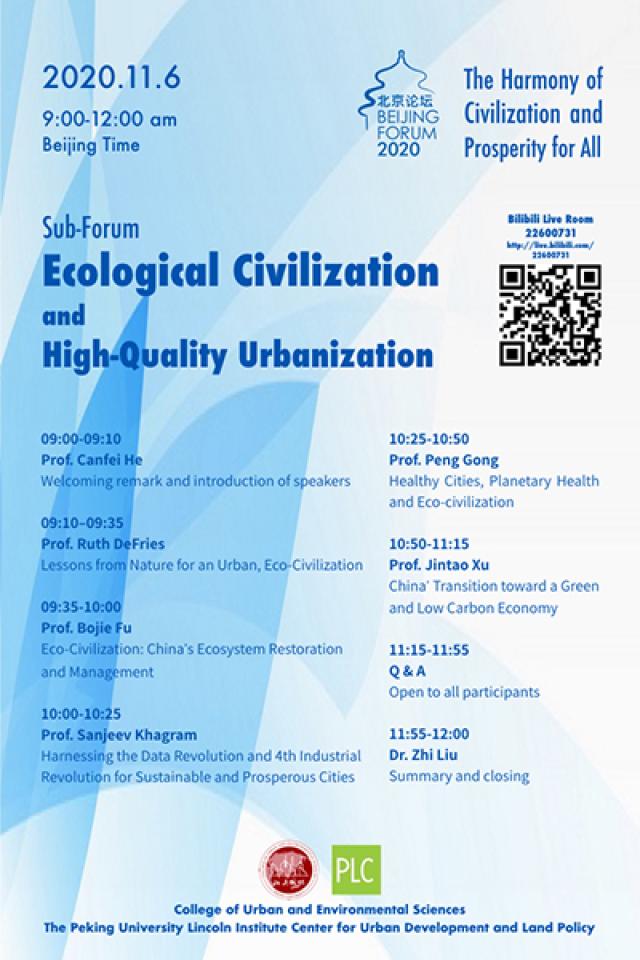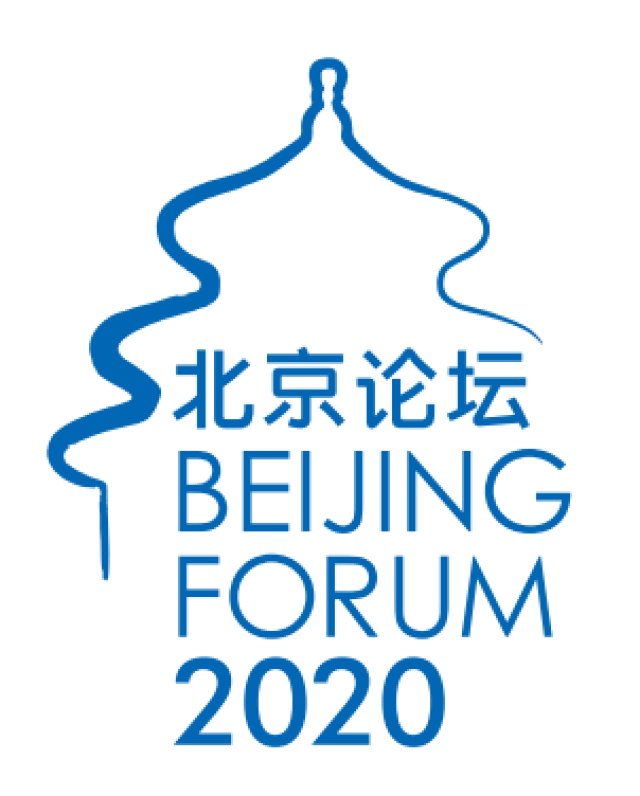新闻动态
北京论坛分论坛:生态文明与高质量城市化
发布时间:2020-11-03
Beijing Forum 2020
The Harmony of Civilization and Prosperity for All
Sub-Forum
Ecological Civilization and High-Quality Urbanization
9:00-12:00 am, November 6, 2020 Beijing Time
8:00-11:00 pm, November 5, 2020 EST
5:00-8:00 pm, November 5, 2020 MST
The Beijing Forum is an annual international academic event co-sponsored by Peking University, Beijing Municipal Commission of Education, and Korea Foundation for Advanced Studies. A sub-forum on the theme of ecological civilization and high-quality urbanization is being organized for Beijing Forum 2020.
Our world is rapidly urbanizing. By 2050, it is expected that 2.4 billion more people will move to cities and 70% of the world population will be urban. The level of urbanization in China is now over 60% and will continue to rise for the next 20 years. Cities generate tremendous benefits to human-kind, with higher productivity, better quality of life, more innovations, and more personal development opportunities. However, rapid urban expansion takes land and water bodies, and invades and weakens ecological systems. Cities are also facing the threats of climate change and the COVID-19 pandemic, prompting us to re-think our mode of urbanization. In order to cope with the conflicts between urbanization and ecological protection, the Chinese government has recently accorded a top priority to the construction of ecological civilization, and formulated strategies to promote high-quality urbanization and encourage nature conservation and ecological restoration. Ecological civilization is a vision for human activities that the socioeconomic development today should not deplete ecological resources for the future generations and should generate more ecological capital for them. The construction of ecological civilization will be a long process requiring the effort of several generations in academic inquiries and evidence-based practices. It is a major challenge for us to find ways to achieve our vision of high-quality urbanization and ecological protection under the conceptual framework of ecological civilization.
The sub-forum will be organized by Peking University’s School of Urban and Environmental Sciences and Peking University—Lincoln Institute Center for Urban Development and Land Policy, and will feature the discussions of various topics by invited prominent international and domestic scholars and practitioners. The topics will include, but not be limited to, the following: trends and challenges of global urbanization; the relationship between urbanization and nature conservation; urban ecological protection and repairs; spatial planning; urban development and ecological protection under climate change; urbanization and water resource management; and international cooperation and leadership in urbanization and nature conservation.
The sub-forum will be held at Peking University with an on-line connection to invited speakers and audiences outside of Beijing. It is scheduled tentatively at 9:00-12:00 am on November 6, 2020 Beijing Time (8:00-11:00 pm on November 5, 2020 EST; 5:00-8:00 pm, November 5, 2020 MST). The list of invited speakers is the following:
Ruth DeFries, University Professor; Denning Family Professor of Sustainable Development in the Department of Ecology, Evolution and Environmental Biology, Columbia University. DeFries uses images from satellites and field surveys to examine how the world’s demands for food and other resources are changing land use throughout the tropics. Her research quantifies how these land use changes affect climate, biodiversity and other ecosystem services, as well as human development. She has also developed innovate education programs in sustainable development. DeFries was elected as a member of the U.S. National Academy of Sciences, one of the country’s highest scientific honors, received a MacArthur “genius” award, and is the recipient of many other honors for her scientific research. In addition to over 100 scientific papers, she is committed to communicating the nuances and complexities of sustainable development to popular audiences through her books “The Big Ratchet: How Humanity Thrives in the Face of Natural Crisis and “What Would Nature Do? A Guide for Our Uncertain Times”.
Bojie Fu, Professor in Geography and Landscape Ecology at the Research Centre for Eco-Environmental Sciences, Chinese Academy of Sciences. He is an academician of Chinese Academy of Sciences, Fellow of the Academy of Sciences for Developing World (TWAS), Corresponding Fellow of the Royal Society Edinburgh UK, and Vice President of International Geography Union.
Sanjeev Khagram, Director General and Dean of the Thunderbird School of Global Management at Arizona State University and the Foundation Professor of Global Leadership and Global Political Economy. He is a world-renowned scholar and practitioner in the areas of globalization, sustainable development, transnationalism, leadership, strategic management, entrepreneurship, social enterprise, cross-sector innovation, public-private partnerships, inter-organizational networks, good governance, transparency, the global political economy, human security, and the data revolution. Prof. Khagram most recently led the establishment of the cross-sectoral Global Partnership for Sustainable Development Data and International Open Data Charter.
Peng Gong, Professor and Chair, Department of Earth System Science; Dean, School of Science, Tsinghua University. Prof. Gong’s research interests include global land surface change, public health, temporal and spatial spread of schistosomiasis, malaria and avian influenza. He received a number of honors and awards including the outstanding contribution award in remote sensing from the Association of American Geographers in 2008 and the Talbert Abrams Grand Award from the American Society for Photogrammetry and Remote Sensing in 1994.
Xu Jintao, Professor and Director, China Center for Energy and Development, National School of Development, Peking University. Prof. Xu’s research interests cover comparative studies of forest management system in developed and developing countries, economics of climate policy and international negotiations, transport management policy, and water rights and water pricing reform in China. He also serves as a member of the Asia-Pacific Forest Policy Think Tank, FAO, the United Nations, a member of Council of Scientific Advisors, Global Adaptation Institute, and senior expert of China Green Carbon Fund.
Program
| Beijing Time |
Speaker | Topic |
| 9:00-9:10 |
Prof. Canfei He, Dean, School of Urban and Environmental Sciences, Peking University |
Welcoming remark and introduction of speakers |
| 9:10-9:35 | Prof. Ruth DeFries, University Professor; Denning Family Professor of Sustainable Development, Department of Ecology, Evolution and Environmental Biology, Columbia University |
Lessons from Nature for an Urban, Eco-Civilization |
| 9:35-10:00 | Prof. Bojie Fu, Professor of Geography and Landscape Ecology, Research Centre for Eco-Environmental Sciences, Chinese Academy of Sciences | Eco-Civilization: China’s Ecosystem Restoration and Management |
| 10:00-10:25 | Prof. Sanjeev Khagram, Dean, Thunderbird School of Global Management, Arizona State University | Harnessing the Data Revolution and 4th Industrial Revolution for Sustainable and Prosperous Cities |
| 10:25-10:50 | Prof. Peng Gong, Chair, Department of Earth System Science; Dean, School of Science, Tsinghua University | Healthy Cities, Planetary Health and Eco-civilization |
| 10:50-11:15 | Prof. Jintao Xu, Director, China Center for Energy and Development, National School of Development, Peking University | China’ Transition toward a Green and Low Carbon Economy |
| 11:15-11:55 | Q & A | Open to all participants |
| 11:55-12:00 | Dr. Zhi Liu, Director, Peking University-Lincoln Institute Center for Urban Development and Land Policy | Summary and closing |

